Sustainability Research at CBU
Sahand Ashtab
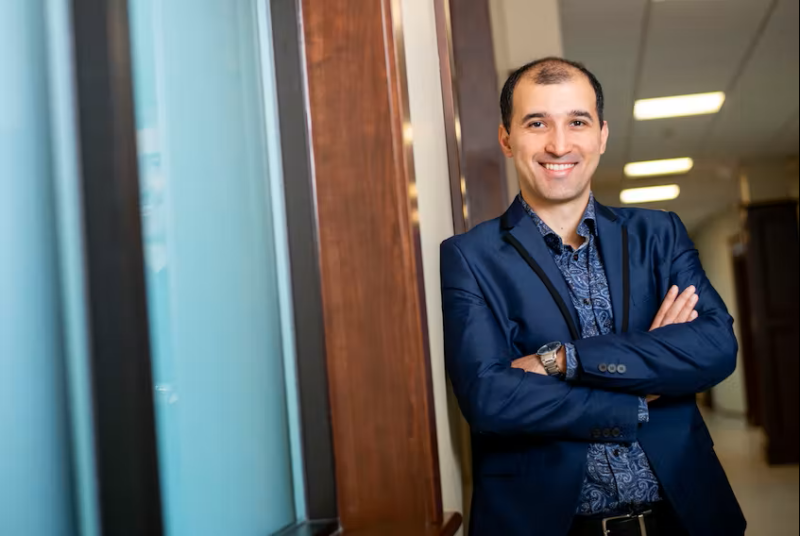
Dr. Sahand Ashtab, Associate Professor, engages in research pertaining to sustainable supply chains, including the circular economy, corporate responsibility, and the impact of consumer behaviour. As the number of repair businesses is decreasing, policy makers, practitioners, researchers, and consumers are attracted more than before to social, environmental, and economic pillars of sustainability. Reuse, reduce, recycle, remanufacture, redesign, and recover are the drivers of a new circular economic model that contributes to elimination of waste, extension of the utilization of products in some shape, form, or rate, and reduce the use of natural resources. In addition to developing conceptual frameworks, quantifying and mapping the circular economy, and exploring the evolution of the businesses operating in the subsectors of a circular economy in different regions, are steps in the right direction to identify gaps in promoting and implementing a circular economic model. One recent exploration of the circular economy indicated that adding washing machines to recovery centres combined with increased return of plastic products, achieved through corporate responsibility initiatives of providing information on plastic type and educating consumers on the importance of plastic recycling, can potentially contribute to both economic and environmental pillars of sustainability with implications for the social pillar of sustainability. An investigation of the most influential factors for buying local indicated that supporting community economic development was the second most influential factor besides food attributes for consumers engaging in short food supply chains. The implication of consumers’ choice of engaging in buy-local activities is reduced transportation emissions.
Learn more:
- Read about Sahand’s research in his own words in the Cape Breton Post article “Closing the Plastics Loop” (2020)
- Read “Scenario-based multi-objective optimization model based on supervised machine learning to configure a plastic closed-loop supply chain network” (2023)
- Read “Explanatory Analysis of Factors Influencing the Support for Sustainable Food Production and Distribution Systems: Results from a Rural Canadian Community” (2021).
Rod Beresford
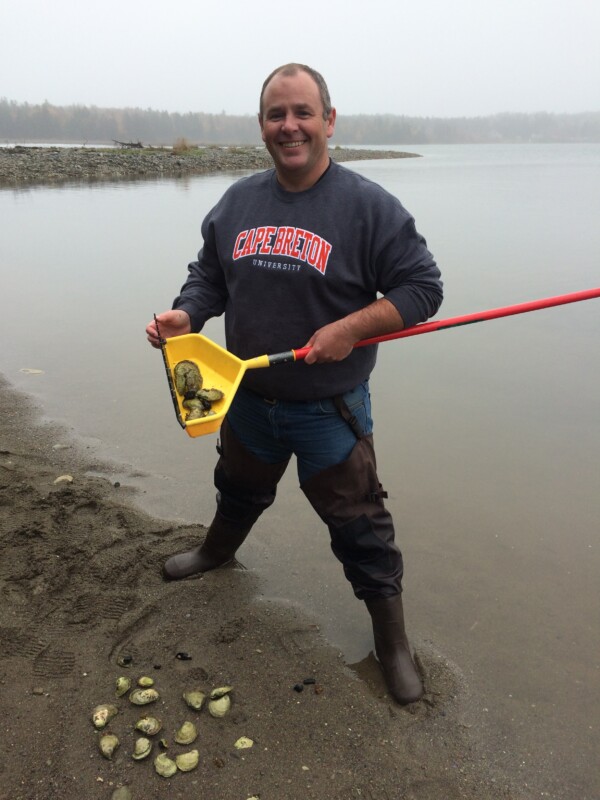
Dr. Rod Beresford, Associate Professor, has been working alongside Bras d’Or Lake oyster leaseholders and government regulators for 15 years to re-establish a once-thriving industry. Between 2000 and 2002, the Bras d’Or Lake wild oyster population and leases suffered significant losses from a protozoan parasite that is lethal to oysters, but harmless to people. Losses in some areas exceeded 95%, leaving few oysters for repopulation. With no eradication options available, methods were devised to rebuild a sustainable industry in the presence of the parasite. In July 2018, the Verschuren Centre, Cape Breton University, and multiple oyster leaseholders embarked on a $788,000 suspended culture project to determine if growing oysters near the surface of the water would mitigate the impact of the parasite. By late 2020, there was sufficient evidence to support this method of growing viable, marketable oysters, and the Verschuren Centre was awarded $2.8M from the Atlantic Fisheries Fund to establish a state-of-the-art oyster hatchery to supply leases and help rebuild stock. Healthy oyster populations aid in the development and maintenance of healthy ecosystems: their filtering capacity improves water quality, their reefs provide a natural habitat for many aquatic species and help to increase species diversity, and their presence along shorelines helps to dissipate wave energy reducing coastal erosion. Oysters are also known to help reduce the effects of climate change through carbon sequestration in their shells. Their role in local and rural economies is significant worldwide and they play a major role in a growing global seafood industry.
Learn more:
- Read about Rod’s work in Readers’ Digest Canada (2022)
- Listen to Freeing Oysters from a Parasite’s Hold (2022)
Bruce Hatcher
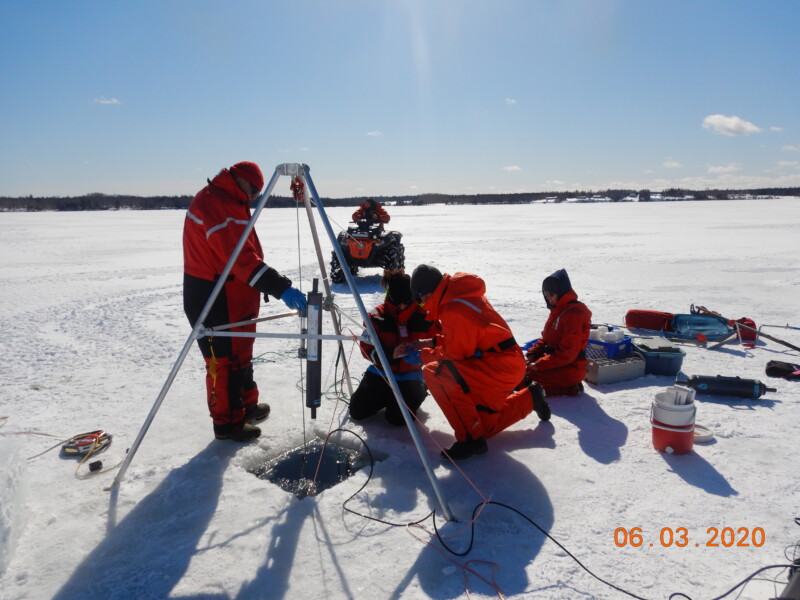
Dr. Bruce Hatcher is University Chair in Marine Ecosystem Research and Director of the Bras d’Or Institute. Since its establishment in 1974, the Institute has enabled research in all aspects of the island ecosystem, including a focus on the roles that the Bras d’Or Lake estuary and its watershed (a UNESCO Biosphere Reserve) play in sustaining the rural communities therein. One challenge has been teasing apart the relative importance of local (e.g. resource overexploitation) and global (e.g. ocean warming) factors causing the progressive decline in the yields of all of the fisheries in the estuary. As communities look to aquaculture to meet the need for employment and high-quality protein, a better understanding of the limitations and opportunities associated with our changing climate is necessary. One hypothesis is that increases in the extent and permanence of low oxygen (i.e. hypoxic) zones in the estuary (a result of higher temperature, reduced water circulation, and organic loading) will compromise the sustainability of certain types of aquaculture, and threaten the recovery of bottom dwelling species such as oysters and lobsters. To test this, researchers in the Bras d’Or Institute are collaborating with partners from the Bedford Institute of Oceanography, Dalhousie University, Perennia Food & Aquaculture Corp. and Waycobah Fisheries Ltd. to explore the conditions for sustainable fish farming in the estuary. A monitoring program started in 2009 has measured a significant increase in hypoxia and documented the most extreme dead zone ever found in marine waters, leading to refinements in aquaculture practices.
Learn more:
- Read “Carbon cycling and redox chemistry in an anoxic marine basin, Bras d’Or Lake, Nova Scotia” (2022)
Stephanie MacQuarrie
Dr. Stephanie MacQuarrie, Associate Dean of Science and Technology and Full Professor of Organic Chemistry, is the founder of the MacQuarrie Group. From rotting wood to stinky crab bodies, converting waste streams to valuable resources is their focus. Most waste from biomass sits around decomposing, generating greenhouse gases and providing very little value back to society.
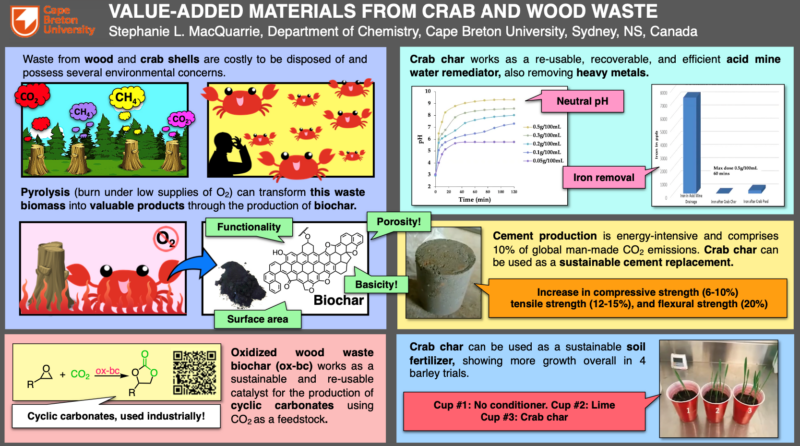
The MacQuarrie Group explores the production and characterization of several value-added products from abundant and local, renewable sources, previously considered worthless and costly waste. Low energy controlled burning, called pyrolysis generates a solid product called biochar (often < 40% yield). Most commonly biochar is used as a low value soil amendment; however, the MacQuarrie Group recognizes increased potential for this interesting solid material. First we had to understand the molecular and physical properties of the chars we create. The process of fully characterizing biochar is tricky, as it is in-soluble, heterogeneous black solid. We’ve used several complementary state-of-the-art techniques and instruments to gain a clear understanding of the properties inherent in the biochar. Unsurprisingly, these chars consist of mostly stable, fixed carbon, but the material also retains residual organics and minerals characteristic of the feedstock. We’ve explored the potential for these biochars in various applications, from environmental remediation to use in chemical reactions and even cosmetics through applied industrial collaborations and fundamental research.
Learn more:
- Visit the MacQuarrie Research Group website
- Read about the new collaborative research project titled “Repurposing marine by-products or raw materials for the development and production of functional foods and bioactives to improve human health and coastal community sustainability”
Martin Mkandawire
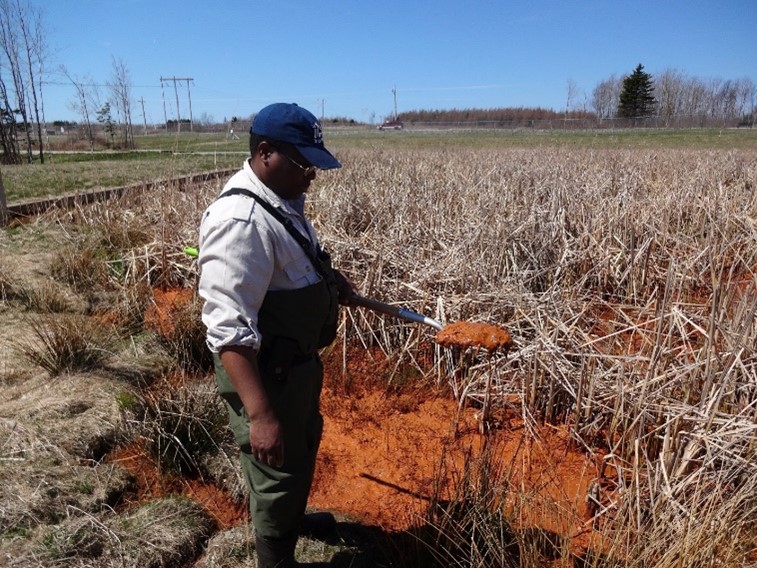
Dr. Martin Mkandawire, Professor and former Industrial Research Chair in Mine Water Remediation (2012-2017), focuses his research on the development of sustainable site remediation procedures for abandoned mines. One of the legacies of mining is the generation of mine water, which, in most cases, poses the risk of acid mine drainage, as well as toxic metals and mining chemical contamination. Restoration and remediation of mine water is a major activity and a long-term public burden because, in most cases, responsible mining companies cease to exist after the termination of mining operations. Mkandawire’s research engages interdisciplinary methods, including field, laboratory, and computational investigation, to develop cost-effective mine water remediation and management strategies based on smart or intelligent technologies. His work is shifting the view of mine water from waste management to resource, promoting the use of mine water pools for geothermal energy and heat dumps, the re-mining of valuable minerals from mine water, the extraction of iron-oxides from mine water treatment sludge for reuse in the manufacturing of magnets, and the use of mine water in the manufacturing of magnetic ink. His work also encompasses the development of predictive models for contamination plume migration and pollution risks in groundwater, long-term methods of monitoring remediated and restored mine sites, and mine closure planning and responsible mining techniques. Dr. Mkandawire is frequently called for expert advice in designing mine water remediation strategies, mine closure planning, and responsible mining around the world, including India, China, South Africa, Colombia, Chile, Peru, Ecuador, and Panama.
Learn more:
- Read about the Application of Nanotechnology in Mining Processes (2022)
- Learn how to communicate more effectively through Ecowriting: Advice to ESL on Scientific Writing in Environmental Science and Engineering (2011)
Alana Pindar
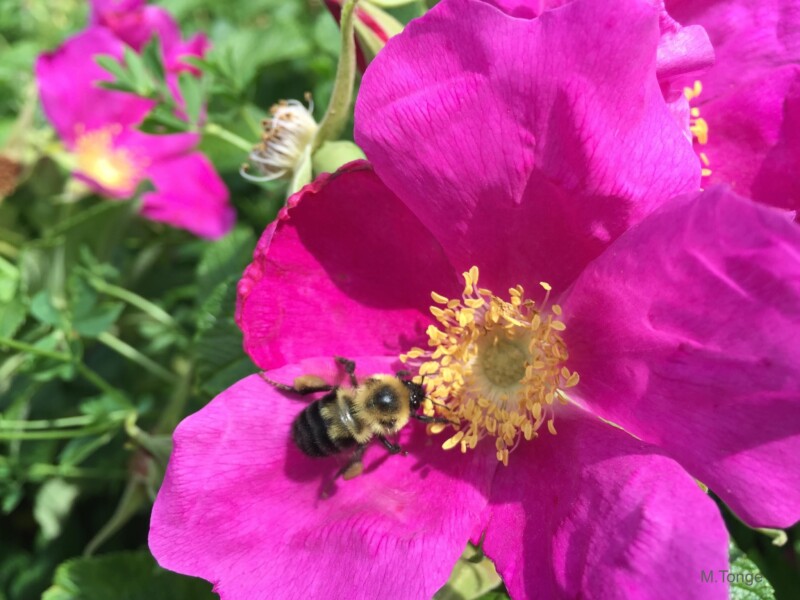
Dr. Alana Pindar is the Weston Family Visiting Professor of Ecosystem Health and Food Security. Native wild pollinators are critical to the ongoing sustainability of agricultural production and the functioning of healthy ecosystems. Pindar’s research program focuses on understanding, managing, and mitigating ecosystem and climate challenges relating to pollination/pollinators, while promoting wellness at local, regional, and global scales. She undertakes interdisciplinary and highly collaborative research to answer novel questions with key academic and scholastic merit that also have direct impacts for environmental and industry practices in Cape Breton, across the country, and worldwide (relating to organisms, populations, ecosystems, global environment/climate), within the broader context of the environment and ecosystem health. Currently, she is collaborating closely with Parks Canada, the Alexander Graham Bell Foundation, and Bell Family members to monitor pollinator activity surrounding the reconstruction of Mabel Bell’s gardens, providing over a century’s worth of baseline insights. Pindar is deeply committed to providing a supportive but challenging environment that promotes experiential learning and discovery to help everyone to achieve their full potential, and continually learns how to better support a training environment that promotes equality, diversity, and inclusion in a healthy and balanced work environment for research, teaching, and outreach.
Learn more:
- Read “Reconstructing an ecological wonder: Cape Breton museum unveils re-created Mabel Bell garden” (2022)
- Listen to “Climate Change and Agriculture” (2022)
- Read “Safeguarding pollinators requires specific habitat prescriptions and substantially more land area than suggested by current policy” (2023)
Reverse Logistics Research
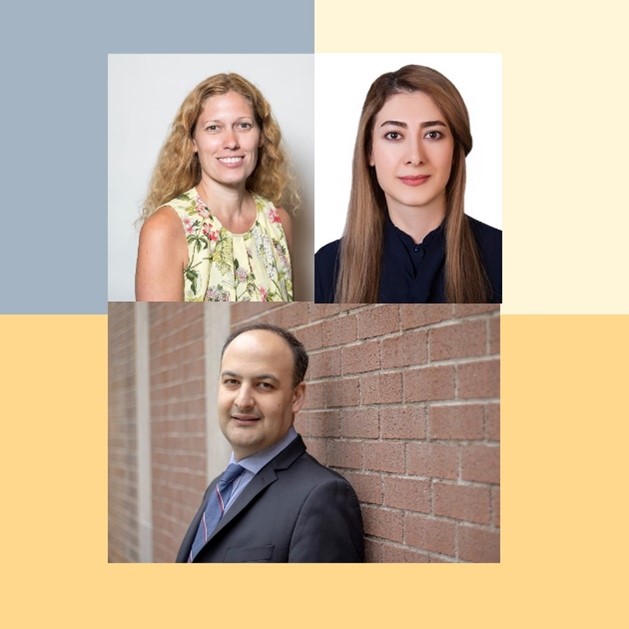
Samira Rouhani, PhD student in Mechanical and Industrial Engineering at TMU, has been working under the supervision of Dr. Saman Hassanzadeh Amin (faculty member at TMU) and Dr. Leslie J. Wardley (faculty member at CBU). Through funding from Drs. Amin and Wardley’s SSHRC Insight Development Grant, Samira is developing a Sustainable Closed-Loop Supply Chain Network Design (SCLSCND) and Sustainable Reverse Logistics Network Design (SRLND) as part of her Ph.D. dissertation. What is unique about this research is the combination of both experts’ opinions and optimization modeling to provide a comprehensive and well-informed approach to implementation of the CLSC (Closed Loop Supply Chain) for decision-makers. In real life, managers need help from experts to align various aspects of RL (Reverse Logistics) and CLSC implementation. For analyzing the experts’ opinions, a survey has been developed to evaluate predetermined propositions. Additionally, developing an optimization model can evaluate the sensitivity analysis on some parameters and scenarios to help identify the key elements of performance in the system. To this aim, Samira is working on the SCLSCND under uncertainty in the textile industry. The results of this research will benefit Canadian companies to save costs and protect the environment. Moreover, policymakers can utilize the results to define legislation and policies related to product returns, cleaner production and environmental, and sustainability assessment. If you are a staff member or manager in production industries or expert in the field of CLSC and RL, you can participate in the anonymous survey. It will take only 10 minutes.
Learn more:
- Read “An Environmental Optimization Model to Configure a Hybrid Forward and Reverse Supply Chain Network Under Uncertainty” (2019)
- Read “A Perspective on Reverse Logistics of Plastic Pallets in Canada” (2018)
- Read “Effects of Uncertainty on a Tire Closed-Loop Supply Chain Network” (2017)
WaTER Lab
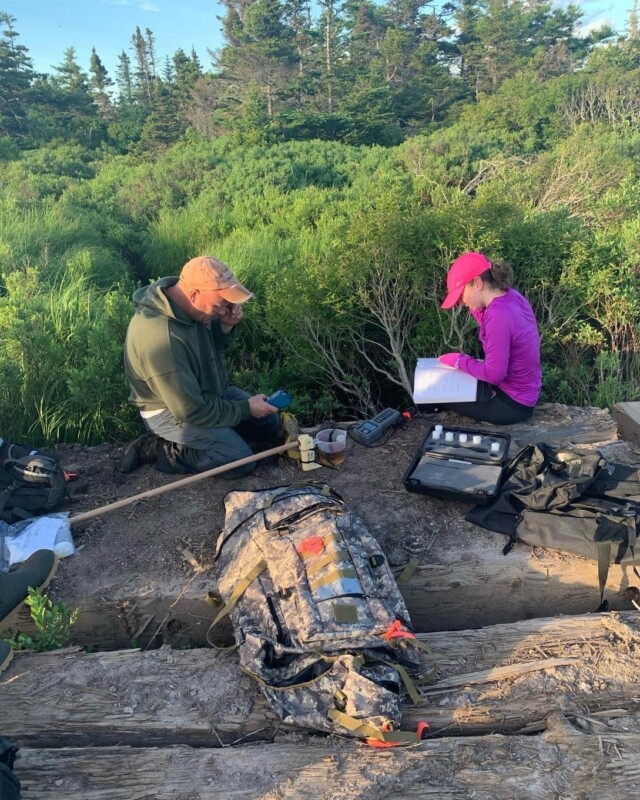
Water pollution is a global challenge in the 21st century, especially for Remote and First Nation Communities (RFNCs) who face a shortage of cost-effective small-scale water treatment systems capable of removing pathogenic microorganisms and trace contaminants. As a result, RFNCs endure long-term boiled water advisories, high waterborne illness rates, and an increased risk of cancer, mortality, and congenital disabilities. In recognition of these challenges, the research team led by Dr. Shine (Xu) Zhang, Tier II Canada Research Chair in Healthy Environments and Communities, Dr. Ken Oakes, Associate Professor in Biology, and Dr. Martin Mkandawire, Professor in Chemistry, have developed the Water Treatment and Environment Remediation Laboratory (WaTER Lab). This world-class lab aims to create innovative, efficient, sustainable, and cost-effective solutions for water treatment and water quality monitoring to address community health challenges on Cape Breton Island, in Nova Scotia, and beyond. The WaTER team has partnered with local utilities, governments, communities, and industries on critical research projects, such as exploration of decentralized water treatment technologies and strategies for the remediation of Boat Harbour, development of an environmental monitoring protocol for Maritime Launch Services, the 1st Canadian spaceport, and designing water monitoring sensor arrays for Drinkable, a Nova Scotia Startup, to provide cost-effective approaches for drinking water monitoring for private well users and remote and Indigenous communities.
Learn more:
- Read a case study on pulp mill wastewater effluent (2022)
- Read the Boat Harbour Fish Population and Contaminant Assessment (2020)
Share your sustainability story!
Are you a CBU researcher whose work is related to climate change, climate action, or sustainability? Would you like to share your work? Send an email to Janice_Tulk@cbu.ca.
